We wrote this guide on How to Juice Cleanse for Beginners after our latest juicing transformation (go here if you missed that), we received a ton of questions from friends, family and followers.
We’ve answered all of them below and now we’re sharing it with you! We hope it helps your juicing journey.
How Many Juices a Day?
The answer to this question depends on who you ask:
- John Rose recommends 3.78 litres per day (128 fl oz)
- Joe Cross (from Fat, Sick & Nearly Dead) recommends around 4 litres per day (140 fl oz)
- For our 24 day juice challenge we consumed 2 litres per day (65 fl oz)
- For a previous 14 day juice fast we consumed 3 litres per day (100 fl oz)
After everything we’ve learned and experienced, we’d recommend between 2 and 4 litres (67-135 fl oz) per day.
What Goes into the Juices?
For the best results, your juices should be mostly vegetables.
Many juice gurus recommend 80% vegetables and 20% fruit. The reasons for this are many, but here’s the most important:
- Fruits spike your blood sugar levels which increases hunger
- Keeping your blood sugar low is linked to long-term weight loss
- Vegetables have more vitamins, minerals and nutrients (especially dark ones)
Aside from the focus on vegetables, the other important factor is the lack of fibre.
When juicing, the fibre is filtered out so you get pure juice. The consistency is closer to water, unlike smoothies which are thicker.
By removing the fibre, you know that anything “leaving” the body is food that was stuck in your digestive system that’s now being processed.
Do The Ingredients Need To Be Organic?
Ideally the fruit and vegetables in your juices are organic for the following reasons:
- In many countries (including the U.S.), organic foods must be grown without synthetic pesticides, genetically modified genes (GMOs), petroleum-based fertilisers or sewage sludge-based fertilisers (yes that’s a real thing! 🤢).
- No chemical herbicides are used
- Organic ingredients are usually fresher (as farmers aren’t allowed to use preservatives)
- It’s more environmentally friendly as goods don’t have to travel as far
- Organic foods are typically more local, which means the money goes to local farmers
Most people are juicing for health as well as the weight loss benefits, therefore organic ingredients are preferred.
If your juices come from a company, 90% will use organic produce. If you’re cost conscious and buying your own fruit and vegetables, buy as much organic produce as you can afford and wash the rest thoroughly:
How To Wash Non-Organic Fruit & Veg to Remove Pesticides
Good old water and baking soda is the best way to remove all the nasty stuff from your fruit and veg:
- Add one ounce of baking soda to 100 ounces of water
- Soak your fruits and veg for 15 minutes.
Can I Juice at Home?
Yes, you can juice at home but you’ll need to get a few things:
Best Option: A Twin Gear Juicer
It takes a lot of fruit and vegetables to make a single juice (because you remove the fibre), which means you’ll spend a lot of time preparing your juices.
A good juicer makes it as easy as pushing the produce into the funnel. A low cost juicer is typically low quality which means you’ll either get less liquid from your produce (making your juicing more expensive) or you’ll have to put the ingredients back through the juicer a second time.
The best juicers are low powered, because the motors of high powered juicers create heat which damages the nutrients in your juice.
You’ll find 3 types of juicers:
1) Centrifugal: Spins at fast speeds so you get your juice quickly but it destroys the healthy enzymes in the juice so it does not stay fresh for long. Doesn’t extract as much juice as the other juicers.
2) Masticating: Spins at slow speeds which preserves the nutrients and allows you to store your juices for up to 72 hours.
3) Twin Gear: Spins at slow speeds, extracts the maximum juice from your produce. Can store juices up to 72 hours.
A good juicer costs between $100-400.
Here’s the most recommended juicers:
Recommended Juicers
Juice Cleanse Equipment: Omega NC800 – $349 (Masticating)
Juice Cleanse Equipment: Omega NC900 – $339 (Masticating)
Juice Cleanse Equipment: Aicook Juicer – $99 (Masticating)
The Super Budget Version
The first time Skye juiced was in Miami in June 2019. He was travelling and made it work with only a basic Hampton Hilton hotel room and the following:
- A Cloth – To lay on the bathroom counter to create a makeshift “board” to chop fruit and vegetables
- A Small Knife – For cutting everything into smaller pieces
- A BlendJet – A mini juicer/blender cup to whizz up the smaller pieces (like this one)
- A Cheesecloth – Place on top of the open cup and pour the juice onto it – it keeps the fibre on the cloth
Honestly while it worked, it was a pain in the ass. After a few days Skye was in Whole Foods every night buying their juice because it was faster, easier and not much more expensive.
Ultimately, decide if you want to save time or money as you cant save both. If you do it right, the cost of your juices will be similar to what you usually spend on food anyway.
Which Juicer is The Best?
How to Juice Cleanse for Beginners, no matter the budget. The most recommended juicers for that first juice cleanse are these:
How Much Does Juicing Cost?
Our latest 30 day juice fast cost us $20 per day each.
That got us 6 raw juices and a ginger shot every day and all of the juices used organic ingredients. These juices were 330ml which is 11 oz.
Initially juicing looks expensive, but when you consider how much you usually spend on food it’s more reasonable. Also consider that you don’t have to pay for a gym membership or expensive supplements.
Best of all, you know the results are inevitable.
How much would you pay to get back into body you had in your early 20’s?
Juicing is the path to that and to us its not a cost, but an investment.
If you juice at home you’ll need to buy the ingredients yourself. Ignoring the cost of gas and the time you’ll waste, you’ll spend approx $4 per 16 oz juice.
With 4-5 large juices a day that runs to $16 – $20.
It sounds the same as our delivered juices, but remember the sizes are different:
- Delivered: Our bottles were 11 oz each x 6 bottles = 66 oz – Total Cost $20 per day
- Home Made: 16 oz juice x 5 = 80 oz – Total Cost $20 per day
You get more juice for your money with home juicing, but you still have to go to the store, prepare and juice your produce and then clean up afterwards.
Or you get it delivered and just kick back knowing your fridge is full, the juice is always ready and the next batch is a few clicks away.
Can I Blend Instead of Juice?
You can, but its not recommended.
When you blend, the juice keeps all of the fibre. Normally that would be a good thing, but with juicing you don’t want fibre because you want your body to “pass” all of the old food stuck in your digestive system.
With juicing or blending, you eat WAY more fruit and vegetables than normal. How long would it take you to eat 3 apples, a big bunch of kale, 2 oranges and half a cucumber? A few hours probably.
When you throw all of that into the blender, it makes a juice you can drink in 30 minutes. That’s a ton of fibre hitting your stomach instantly. Your body realises there’s too much fibre and you poop it out quickly.
Many people have been constipated for years before juicing, so pooping a lot feels good and they think its working, but its only the fibre they just ate.
When you juice, you discard the fibre which means its only the juice coming in, so anything coming out is old food that was stuck inside you.
Its far more satisfying to still be pooping days after you stopped eating solid food. It feels like you’re making progress rather than just cycling through a fibre-poop cycle.
How Long Should I Juice?
This depends on your goals, your current level of health, how mentally resillient you are and many other questions only you can answer.
But generally speaking we’d recommend you start with a 3 day juice fast. That gives you a taste of the juicing experience and you’ll see some results which encourages you to fast longer next time.
If you’re concerned about how tough juicing will be then build up the durations:
- 3 Days
- 7 Days
- 10 Days
- 14 Days
- 30 Days
If you’re ready to go hard and you’re committed to changing your life then base it on how much fat you want to lose.
Many people report losing a pound a day while juicing, but remember it’s a mix of fat, water (for every gram of carbs you eat, your body stores 3 grams of water) and having no food in your stomach.
So if you need to lose 15 pounds, go for a 30 day juice fast – that gives you a realistic goal of half a pound a day. Even after you start eating again and your body normalises, you’ll still be way lighter and you may even find you lose more than 15 pounds during that time.
More important than your weight is how you look and feel. We promise you, what you see in the mirror will say so much more than the scale ever could!
How Often Should I Juice?
This depends on:
- Why you are juicing? – Is it for long-term health? Weight loss? For a upcoming vacation or long term?
- Where are you now? – How bad is your current condition? Are you undoing years of abusing your body?
- Where do you want to be? – How much weight do you need to lose to be happy?
The answers to these questions tell you how much juicing you need to do. That could mean a long reset (e.g. 30 or 60 days of juicing to get back to “baseline”) or shorter but more frequent juicing “sprints”.
For us, we decided to start with a reset of 30 days (which ended up being 24 days, see our results and experience here).
After that we’ll eat raw food 95% of the time, have 5% of whatever we want and then juice for 7 days every month to keep us in check.
Start with a juicing sprint you can manage easily and from that experience you’ll know how often you can handle juicing and how much you need to juice to get to where you want to be.
How Big Should Each Juice Be?
This depends on your appetite and how you like to eat.
- Do you prefer fewer, but larger meals?
- Do you prefer smaller meals, more frequently?
Generally a juice is anything from 11 oz/330ml (a can of coke), to 16 oz/470ml (a little smaller than a bottle of coke).
We had 6 small juices (330ml/11 oz) a day, which gave us a juice every 2 hours. That worked better than our first time juicing when we had a 16 oz juice 4 times a day.
Do I Need Shots?
Some people like a shot in the morning to start their day. On our recent juice fast we started with a ginger shot which woke up our bodies and got us ready for our first juice.
Its not essential, but we liked starting our day with a blast of ginger – It was like a nutritional powerhouse in a bottle!

Does Juicing Make You Bloated?
When juicing you’ll notice your bloating goes down. You can wear tighter tops again and you won’t have to suck your belly in all day.
But you’ll be bloated sometimes, even though you didn’t eat anything. Here’s why:
- Drinking your juices too fast – Some juices contain a lot of fruit sugar (fructose) that hits your stomach in larger amounts than normal. That causes bloating and diarrhoea. To avoid this, drink some water before your juice and sip your juice slowly (try to make your juice last at least an hour).
- Part of the detox process – As your body processes out the toxins, strange things happen. You’ll get gassy, be bloated and your poop will smell like roadkill occasionally. 😜
Stay with the process, ride the short term waves and focus on the overall result you’re already on the way to achieving.
Can I Eat With My Juice?
No, juicing is a “solid food vacation” which means you consume zero food until the juicing is over.
After your juice fast is complete, you might decide to incorporate juices or smoothies into your daily diet. If you do, then you can eat, but we’d still recommend drinking your juice first thing in the morning and eating your (clean) food later.
Starting your day with juice gives your body the vitamins and nutrients it need to get you through the day, and by starting with a healthy choice, you’re more likely to make better choices later in the day.
Are Juicing Diets Good For You?
There are mixed feelings on this. Whilst everyone agrees more fruits and vegetables are a good thing, it comes down to how you use juicing:
- Using juicing to Yo-Yo diet up and down is dangerous for your health
- Finishing juicing and going back to the diet that made your body sick is a bad idea
- Doctors say eating your fruit and vegetables is better for you because of the fibre. This is true for the average person and for a long-term strategy, but juicing isn’t meant to replace normal, good eating habits
- Juicing can reduce your body fat, your risk of cancer, your immune system and eliminate dangerous toxins from your body
- You give your digestive system a break and heal it – More than 2,000 years ago, Hippocrates (the father of modern medicine) said all disease begins in the gut. Scientists are still debating this, but we know what you eat directly affects the body, most importantly related to inflammation which is known to be catastrophic to your health.
- Some doctors say juicing causes nutrient deficiencies – but your regular diet is almost most certainly far more deficient than the ton of vitamins and nutrients you get from a plant and vegetable based juice diet
We realised long ago that conventional advice about diet, nutrition and health is misguided. Doctors get less than 2 weeks nutritional training throughout their entire education – yet we’re expected to listen to them!
After you juice you’ll know how much healthier you feel and everyone around you will tell you how much better you look (even if you didn’t tell them about your juicing).
These two pictures say everything – they were taken 25 days apart and the difference is clear:

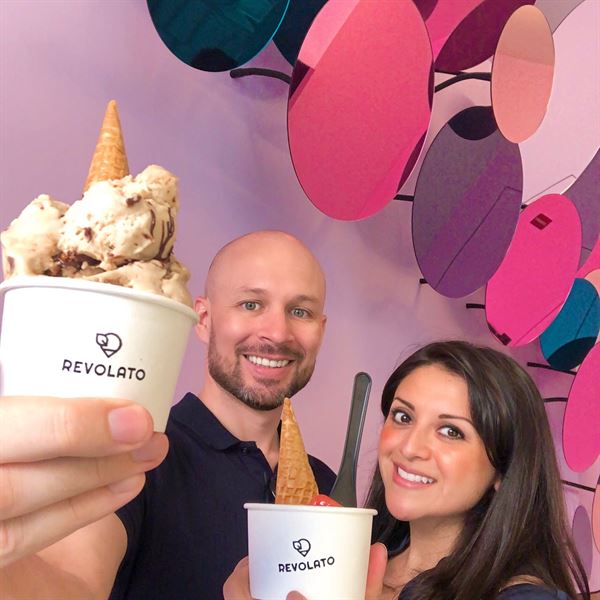
Are Juice Diets Safe?
Juice diets are safe for almost everyone.
If you saw Fat, Sick & Nearly Dead (the juicing documentary) you’ll see Joe Cross who had an auto-immune condition (chronic urticaria) heal himself with juicing.
In the movie he meets the 400+ pound truck driver called Phil who had the same disease.
With doctor supervision (due to his condition) Phil embarked on his juicing journey and transformed his health:
For most people juicing is healthy, safe and practical. We don’t recommend you spend the rest of your life on only juice – anything extreme always causes deficiencies and anyway, eating is fun!
Seek balance friends.
Should I Add Water?
You do not need to add water.
When you juice, the fruit and vegetables will release the water they naturally have in them. Adding more doesn’t do anything good and it doesn’t reduce the amount of sugar in the juices (which is totally fine anyway).
Should I Drink The Pulp?
No, you should not drink the pulp.
Juicing requires that you remove the fibre/pulp. That ensures your body clears the undigested food stuck in your digestive system. Importantly, it gives your digestive system a rest from the constant food which allows it to heal.
Where Does My Protein Come From?
You don’t need as much protein as you think you do.
The meat industry injects millions of dollars into the campaigns of politicians and then pressures them to say meat is healthy and a necessity for health. This is clearly wrong, we know animal foods are disastrous for our health (animal protein-rich diets are associated with a 43% increased risk of death from cardiovascular disease and cancer, compared to diets low in animal protein).
It seems our politicians have sold us out – As they say, “he who pays the piper, calls the tune”.
The truth is you need far less protein than you’ve been told. Studies tell us we need only 0.8 g/kg/day (about 36 grams of protein per 100 pounds of body weight). If you’re eating a varied plant-food diet, its near impossible to eat too little protein. A 1800 calorie diet gives you around 65 grams of protein thanks to the green vegetables, seeds, nuts and beans which are rich in protein.
During juicing, you’ll get around 30 grams of protein per day (mostly from dark leafy greens like spinach and kale).
If you weigh 75kg you need 60 grams per day (0.8 x 75 = 60) – so you’d be consuming only 50% of what you need each day while you juice. But remember your juicing will be short term to get you back to baseline so you can continue a healthy, whole food diet which meets all of your nutritional needs.
Will Juicing Make You Constipated?
Juicing can make you constipated in the short term.
Many people live with constipation due to their diets and when they start juicing they’re amazed at how easily they can go. That lasts for the first few days as the body clears out all the backed up food in your system. After that you might go a few days before anything comes out.
That’s because you’re stopped putting food into your body, so nothing comes out. The body is adjusting and it will find more undigested food in your system to purge after a few days.
You’ll go through cycles of “can’t stop pooping / totally blocked up” but normal service resumes once you go back to eating your normal diet.
Will Juicing Make You Poop?
Yes, a lot.
For the first few days its glorious. That feeling of being backed up goes away and you enjoy being able to go without too much struggle.
At some point you’ll get constipated as there’s no food entering your system the whole time. That goes away and when you go back to eating solid good, everything will be normal again.
Can I Make My Juice The Night Before?
Whilst you can do this, we don’t recommend it.
When you juice your ingredients the nutrients are fresh and complete. The longer you wait to consume the juice, the more damaged the nutrients get. Like a piece of fruit left out for a few hours, the juice starts to biodegrade and you lose the valuable vitamins and minerals.
So try to drink your juice as soon as you can.
If you can’t, a masticating or twin gear juicer is the answer. They preserve the nutrients and you can store your juices for up to 72 hours.
Here’s some good options.
Is Juicing For Beginners?
Juicing is for anyone ready to change their bodies and their lives.
Even if you’ve never done it before, educate yourself so you know what to expect and prepare well.
Is Juicing Expensive?
Juicing can be expensive, see these answer for more details:
Can I Do Juicing To Detox?
Juicing is an excellent way to detox your body!
Giving your body a break from solid food allows it to heal itself. Filling up on juices packed with vitamins, minerals and nutrients during this time gives it the raw materials it needs to detox effectively.
You’ll notice your skin, hair, energy, mood and vitality all transform in as little as 7 days with juicing.
Can I Do Juicing Without Losing Muscle?
Yes, even with juicing you’ll experience little to no muscle loss.
We covered how much protein you really need, but if you’re still worried, focus on dark leafy greens to meet your protein requirement.
We don’t recommend supplementing with protein powders during your juicing.
You could also do bodyweight exercises during your juicing, but anything more strenuous is probably not going to be possible for most people.
This video from the 66 year old (!) John Rose shows you how in shape he is, but more importantly answers this question better than we can:
What Are The Benefits of Juicing?
This list could be very long, but here’s the summarised version of the many benefits of juicing:
- Reduces the risk of cancer
- May help delay the onset of Alzheimer’s
- Gives your digestive system a rest so it can heal
- Boosts your immune system
- Protects against cardiovascular disease and inflammatory diseases, like rheumatoid arthritis
- Removes toxins from your body
- Aids digestion
- Weight loss
- Gives you a greater concentration of nutrients per ounce
- Increased consumption of fruits and vegetables gives you more nutritional variety
- Enhances absorption of nutrients
- Reduced risk of coronary artery disease.
- Get your 5 a day – 150 ml of juice counts as one of your five recommended servings
Where Can I See Some Juicing Before and Afters?
Here’s Skye’s before and afters from his July 2020 juice fast:



And here’s some other impressive transformations:

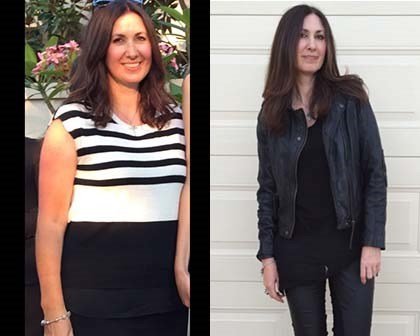




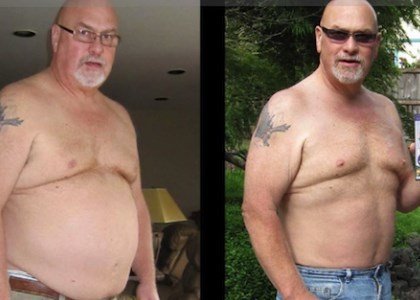
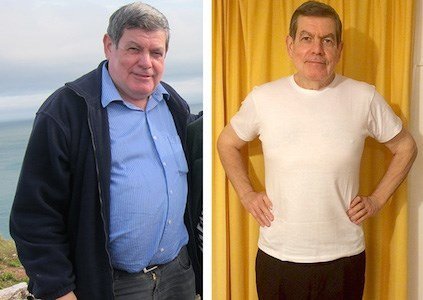
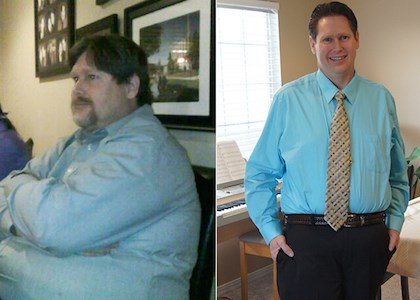


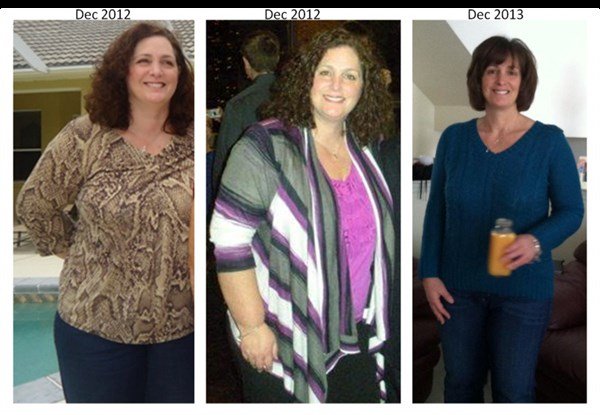
What Are The Juicing Essentials?
You’ll need the following essentials to juice successfully:
- A juicer (here’s the best ones) or a juice delivery company
- A long-term focus
- Willpower and commitment
- No food in your house (at all!)
- Postpone social events or anywhere “normal non-juicing people” are
- Planning ahead
- Patience with yourself and everyone else on earth! 😄
Where Can I Watch a Juicing Documentary?
There are many juicing documentaries, but the original and best will always be Fat, Sick & Nearly Dead which literally started the modern juicing wave.
Most people who watch it are already on Amazon ordering a juicer before its over, here’s why:
Are There Juice Delivery Companies?
Yes there are many juice delivery companies in every city.
Click this link and you’ll find the companies near you.
We used Urban Monkey in Bucharest while we were travelling through there for July.

What Foods Should I Eat After Juicing?
After juicing, you should focus on a more sustainable, balanced way of eating. Don’t go back to the habits that made your body sick in the first place.
We found the best way to transition out is to eat a raw vegan diet after juicing.
We eat a oats and fruits bowl with nuts, dark chocolate and berries for breakfast:

Followed by one or two big salads later:

We’ve stayed lean (Miriam felt like she was still losing weight even weeks later).
Ultimately, a focus on a whole food, plant-based diet seems to be the most successful way to transition out. Sure we’ve still had the occasional treat (Vegan pizza and a Beyond Burger) but we actually enjoy eating healthier now – thanks to juicing our taste buds have been reset to get more pleasure for wholesome, real food!
How To Overcome The Juicing Headache
Drink more water.
Usually the headaches are because you’re dehydrated. It can also be a detox reaction, your body is to missing a stimulant like sugar or caffeine that it got used to.
Don’t take aspirin or paracetamol while juicing, they are toxic and you’re trying to heal. Instead try natural remedies like:
- An epsom salt bath – Warm (not hot), 1 to 2 cups in a regular size tub
- A warm shower, followed by a cold minute to close your pores
- Deep, long and slow breathing
- Herbal tea like peppermint, ginger or chamomile
- Essential oils especially peppermint or lavender
What are the Common Juicing Side Effects?
You’ll likely experience some of the following (all are temporary):
- Headaches – More on that here
- Feeling sensitive or emotional for no reason
- Fluctuating body temperature
- Fatigue
- Hatred for all of humanity (including yourself)
- Caffeine withdrawal
- Lightheadness
- Dry Skin
- Acne breakouts
- Reduced appetite
- Slower hair and nail growth
- Bad breath at times
- A furry tongue (use a scraper like this)
- Diarrhea
- Constipation
- Feeling Hangry
- Struggle to focus
Should I Weigh Myself During Juicing?
We don’t believe you should.
Juicing causes your water weight to fluctuate and using the scale as your reference point causes you to make bad decisions. Use the mirror instead, you’ll see the results visibly which is far more important (and motivating) than a number on the scale.
Got More Questions?
Send us any other questions you have here and we’ll add them to this guide (so everyone benefits) and we’ll email you once your answer is ready.
If you enjoyed this, you might like these posts:













OMG ! I just want to say thank you for doing this 🤗 I am actually trying to lose some body fat I have for a pageant i am in coming soon! So honestly this was just the boost I needed! Veryyyy knowledgeable & I am happy to share this with friends 💛💛
So glad to hear it helped you Katherine!
We really found juicing to be beneficial for us, total transformation physically but also vitality wise. Clear skin, whiter eyes and a radiance of health is the only way we can describe it.
Best of luck with your pageant, sending you love and vibes.
Miriam & Skye x
Can children or toddlers go on a juice fast?
Hi Bre
Honestly, we’re not medical professionals, but we’re almost certain that’s not a good idea. Children have far different needs to adults as they are growing and we doubt the juice would provide enough nutrients for all the bodies functions.
Even though the intention is well meaning, juicing is also incredibly taxing on an adult body, let alone a child. We think it’s also important to note that children often can’t express what they want or need and juicing seems unnecessary and demanding for toddlers and young kids.
Hope this helps.
Skye & Miriam x